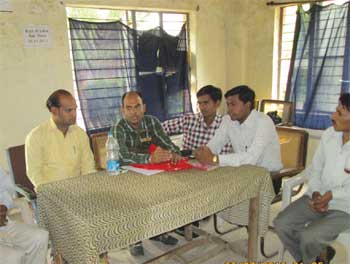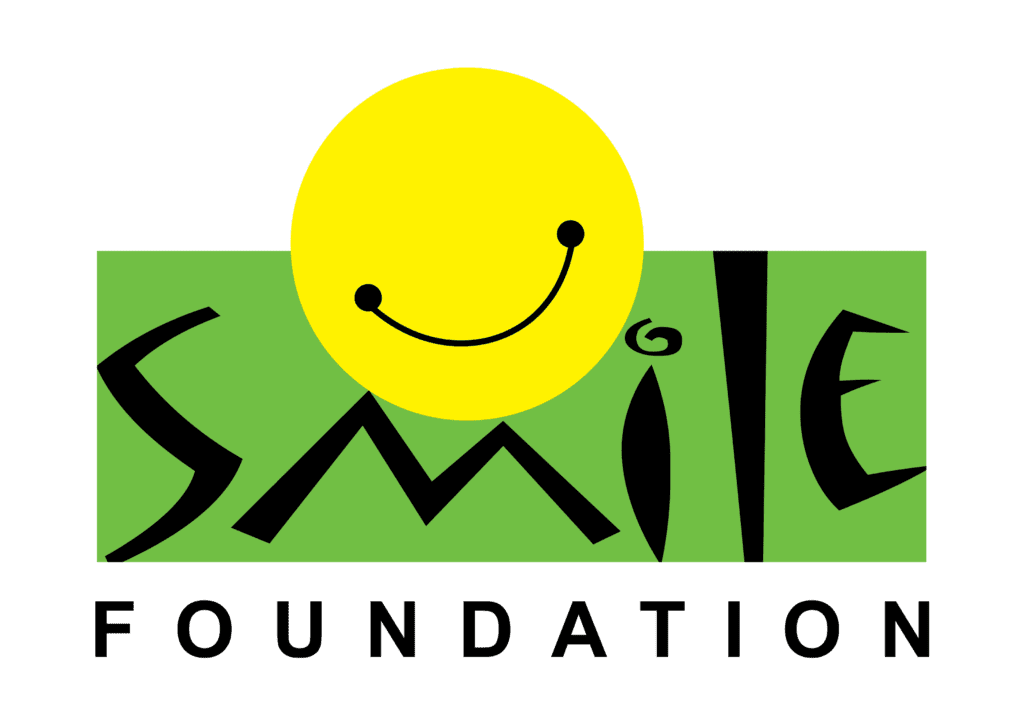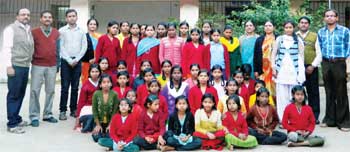
New remedial education centre for girls in Bilaspur
A remedial education centre has been set up at Mission Education centre Shikhar Yuva Manch for 50 girls in Bilaspur, Chhattisgarh. These girls, belonging to different age groups, come from various parts of the state. They have had a difficult childhood, being runaway kids, child labour, orphans, children of jail inmates, etc. And education is the only hope for them to free them from the shackles of poverty and suffering.
The remedial education centre provides them with a space to express their emotions through creative activities like painting, singing, dancing, etc, which is a critical aspect of their rehabilitation. Extra coaching in academic subjects is provided at the centre, to help them cope with their studies. These girls are also taken on excursions to important places to instil a sense of confidence in them. The remedial education has helped the children emerge from their past trauma and brought about positive changes in their behaviour.
More women and girls accessing healthcare in Jamnagar
W omen and girls in the 24-odd villages of three blocks of Jamnagar district in Gujarat are emerging from their traditional mould of nonhealth seeking behaviour and juggling their household responsibilities in order to access healthcare services provided by Smile on Wheels mobile medical unit.
This change in the behaviour pattern has emerged from the village-wise patient summary recorded during the period of October-December 2012. The period saw 4366 women coming forward to access comprehensive healthcare facilities of the Smile on Wheels mobile medical unit in comparison to 2696 males. A two-fold increase of female patients has been observed from the records when compared with the baseline study conducted at the beginning of the project in 2011.
Jamnagar Smile on Wheels project, conducted in partnership with CAIRN India, has benefitted 19,627 women out of 33,034 beneficiaries through 738 healthcare camps since 2011.

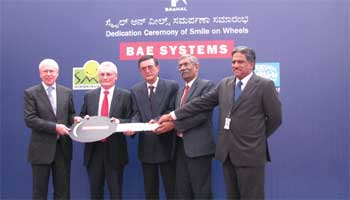
Smile on Wheels in Bengaluru in partnership with BAE Systems
S mile Foundation launched its stateof- the-art Smile on Wheels mobile hospital in partnership with global aerospace, defence and security company BAE Systems to provide primary healthcare services to underserved communities in Bengaluru. The mobile medical unit will be operated by the Bangalore Baptist Hospital.
The mobile medical unit offers doorstep access to state-of-the-art medical equipments and facilities such as X-Ray, ECG, IV fluid transmission and basic pathological testing. The programme also envisages setting up referral linkages with local hospitals as well as establishing a community health fund to become selfsustaining over the long-term. In the first year of operations, the outreach of the mobile unit is estimated to be over 20,000 people.
Rakhika carves her own destiny through STeP
B .Radhika is a class 10th pass out. At the age of 16, she was married off to secure her future. Her husband had a small electrical shop, but his income was not enough to sustain the growing
family.
Radhika wanted to pursue studies and was admitted to a school. But due to financial constraints, she had to quit. In the meantime, Radhika gave birth to two children, adding to the burden on the family.
Radhika was worried for her children’s future. She was desperate to get into a decent job. But with her low communication and technical skills, she couldn’t clear any interviews. During those days, her husband heard about STeP, an employability training programme of Smile Foundation. She was enrolled for the programme at the Secunderabad centre Arunodhaya. In the next six months Radhika underwent training in English, computer proficiency, etc. After completion of her course, she got a placement with M/S Universal, a mobile retail outlet chain, as a sales associate with a salary of Rs. 6,500 per month. In due course, she was further promoted as a supervisor due to her sheer hard work.
Radhika now augments her family income and takes care of her children’s education. They are studying in class 5 and 6. She is happy to secure her children’s future.
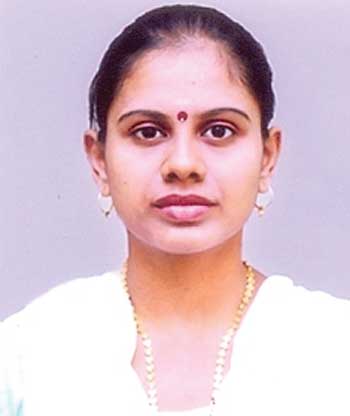
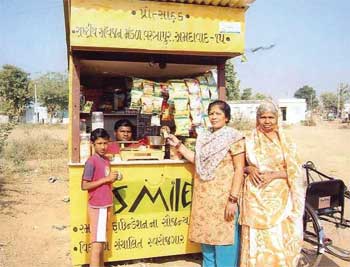
Income generation project for persons with disability
Kaduskar Pankajbhai Hasmukhbhai suffers from 85 percent physical impairment as a result of polio. A resident of Saddbhavnagar in Ahmedabad, he dropped out of school after class 9 owing to financial condition of the family. He started selling eatables and confectionery from a small table outside his home, earning a meagre sum of Rs 1500 in a month. After hearing about the income generation support project run by Mission Education centre Blind People’s Association for persons with disability, Pankajbhai approached the officials there.
Under the project, telephone booths are set up for persons with disability from poor economic background, to equip them with the means to earn a decent livelihood and instil a sense of confidence to participate in the socio-economic process. In the last one year, around 40 people like Pankajbhai have been provided with telephone booths.
Today, Pankajbhai runs a telephone booth near his house and earns Rs. 160-180 in a day. He also stocks confectionery, eatables, and cold drinks in his booth to earn additional income.
One year of Sanjeevan Smile on Wheels in Madhepura
S anjeevan Smile on Wheels project, providing affordable healthcare services to the doorsteps of the families living in ten targeted villages of Madhepura district in Bihar, completed one year of operations in March this year. The project, carried out in partnership with Siemens India, covers the villages of Sahugarh – I, Sahugarh – II, Chakla, Sripur, Mithai, Naya Nagar, Bhatu Tola, Balam, Sikhasan and Sabila in Madhepura and Ghailadh
block.
Besides providing a wide range of preventive and curative health services to more than 18,000 underprivileged villagers in the last one year, the project also conducted around 1067 health awareness and multi-specialty camps to augment its services.
The mobile medical unit was pressed into service in the identified areas after a baseline survey revealed that 95 percent of the community in these villages belonged to lower income groups. There was complete ignorance about the components of Maternal and Child Health, institutional deliveries, etc. The villages lacked primary healthcare services, increasing their dependency on quacks.
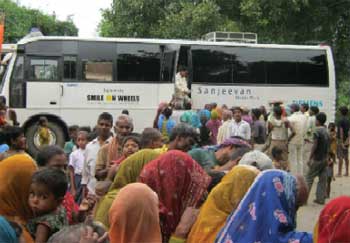
Healthcare for underprivileged children across India
Across India, 5000 children from economically disadvantaged backgrounds received curative primary healthcare services, whereas 50 children were included under critical ailment and surgery support between January and March 2013 as part of a special healthcare scheme launched with support from Kansai Nerolac Paints Limited. The children, between the age group of 0–16 years, were selected from remote villages and urban settlement colonies The primary healthcare services include general screening and treatment, growth monitoring, immunisation/vaccination, pathological tests and diagnostics, eye checkups and dental screening, which are provided through the Smile on Wheels mobile medical unit. |
For the critical ailment and surgery support, children suffering from serious and life threatening conditions like kidney disease, aspiration pneumonia and sepsis, acute gastroenteritis with septicaemia, epilepsy, Wilson’s Disease, Rett’s Syndrome, leukaemia, meningitis, tumour, and thalassemia were selected in consultation with well known hospitals such as All India Institute of Medical Sciences (AIIMS), St. Stephen’s Hospital, and St. Mary’s Polyclinic.
These children required hospitalisation, extensive treatment as well as surgery in some cases and their parents were unable to afford the treatment.
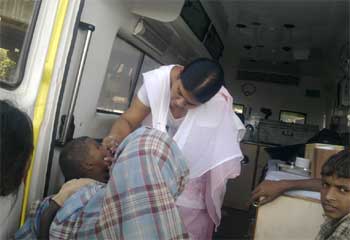
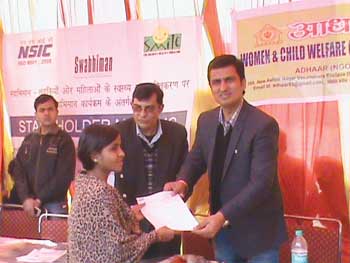
MLA Anil Kumar Chaudhary at Swabhiman event
Addressing a stakeholder meeting of Swabhiman programme at Bismil Camp in Shashi Garden, Delhi in January, MLA Patparganj, Anil Kumar Chaudhary commended the development activities of Smile Foundation, particularly Swabhiman programe, for the welfare of underprivileged women and girl children in the national capital region through activities like scholarship programme, counselling sessions and workshops for gender sensitisation and community
mobilisation.
The meeting was conducted to orient the stakeholders, including National Small Industries Corporation and Swabhiman centre officials Adhaar, on the progress made under the programme and to provide the community members a platform for interaction. Scholarships were also presented to girl students on the occasion. A mass awareness drive was undertaken by Swabhiman’s health volunteers on maternal and child health, institutional deliveries and male participation and involvement in the area of gender health.
Open House meetings for children
TThree Open House meetings involving around 100 children have been conducted in Mission Education centre Diksha Foundation, Patna, to involve the children in the decision making process. Open House meetings are a common practice in the space of alternative education and help create an open space – where learners feel a high sense of ownership and are not afraid to voice their opinions. It also promotes group learning, apart from building a non-hierarchical classroom.
In one of the meetings, both the learners and teachers shared the challenges which they are facing, for example time allocation for usage of computer by individual children. Another issue pertained to dance practice – as many of the children are interested in it. Through these meetings, children also get insights into the meaning of democracy and equity. It further helps the officials to get a direct feedback on their work from the children.
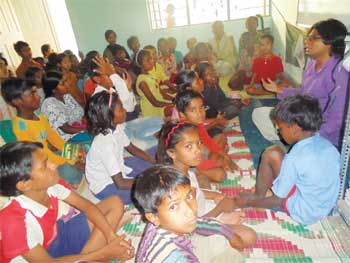
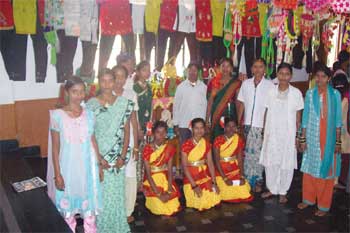
Twenty Smile girls join Madura Fashion & Lifestyle
Around 20 girls from Bangalorebased Mission Education centre Sisters of Charity have been provided employment with Madura Fashion & Lifestyle, the retail wing of Aditya Birla Group.
These girls were part of the Gruhini (woman) course, which provides training in tailoring and other related activities. Apart from a monthly salary, these girls have also been provided with hostel facility and canteen services for a nominal sum. So far, about 150 students of the centre have been placed in Madura Fashion & Lifestyle. The association has helped these students get exposure in a corporate set-up. Earlier, the girls would work from home on nominal wages. But now they are get regular salaries and are able to support the education of their younger siblings through their savings. Till now, 250 students of the Gruhini course have been placed in retail units like Madura Fashion & Lifestyle, K Mohan and Aravind Garments in the last three years.
Polio awareness rally held in Barmer
On the eve of the National Polio Pulse campaign on January 20, a polio eradication awareness rally was conducted in Ranakpur village, Barmer to spread awareness among the common masses about the debilitating disease and motivate them to bring their young children for polio immunisation drive.
The rally, conducted in association with the district health department, was flagged off by CMHO, Barmer Dr. Jitendra Singh from the district Swasthya Bhawan. About 300 students of GNMTC Government Hospital took part in the procession which passed through the village. Apart from CMHO, others attending the rally included RCHO Dr. M.L. Maurya, AYUSH Coordinator Dr. Anil Jha, and senior officials of GNMTC.
The awareness rally was part of the preventive healthcare measures adopted under the Smile on Wheels programme in the rural areas of Barmer, Rajasthan in partnership with CAIRN India.
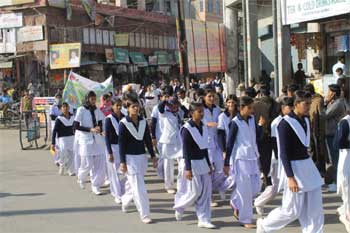
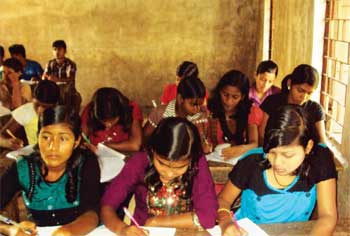
Student's mobilisation camps held in Klinganagar
Monthly students’ mobilisation camps have been conducted in the remedial centres set up in five schools in Danagadi block of Kalinganagar area in Jajpur district since January. The remedial centres, set up in partnership with Jindal Stainless, provide additional coaching support to underprivileged students lagging in studies.
Through these camps efforts are undertaken to develop linkages with the students, assess their progress, mobilise the students to focus on their studies and also develop an understanding of the difficulties faced by the students.
Feedback forms with questions pertaining to current educational status of the students, problems faced within their families or school surroundings, teachers’ attendance, and indifferent attitude of the teachers are circulated among all the students. These feedback forms are meticulously studied by the programme staff to effectively address the concerns of the students.
The mobilisation camps have helped improve the outcome of teaching learning process in the remedial centres, while also establishing rapport with the community in the area.
Odisha State Youth Policy 2013 consultations
Smile Foundation took part in the consultative sessions towards the formulation of the Odisha State Youth Policy 2013 in February. The Youth Policy aims to pave the way for expending opportunities through youth centric programmes and investment in the youth by mainstreaming their concern across sectors to expand the scope of youth participation, engagement and involvement in
economic, political, social and cultural spheres. The state government was holding consultations with NGOs, grassroots organisations and experts to gather their inputs on the needs and concerns of youth in the formulation of the policy, which has been launched in April by Chief Minister Naveen Patnaik.
At the consultative session, Smile Foundation shared its learning from Smile Twin e-Learning Programme (STeP) with specific inferences to livelihood programme. So far, 13,448 urban underprivileged youth have been trained under the STeP programme and 9633 of them have been employed in more than 140 brands from retail and service sectors across India.
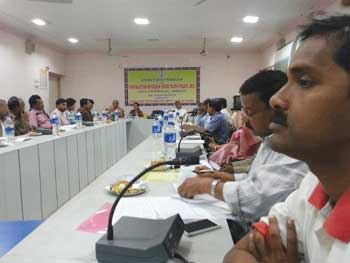
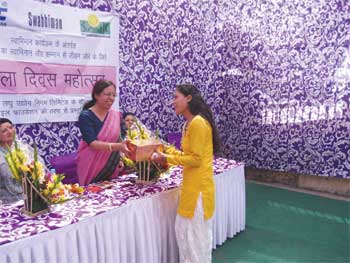
'Change agents' felicitated
O n the occasion of International Women’s Day, Swabhiman felicitated its 12 ‘change agents’ from Shri Ram JJ Camp in Dhaula Kuan, Delhi, for their valuable contribution to the success of the integrated community development project being carried out in the area, in partnership with National Small Industries Corporation (NSIC). These change agents – Community Health Educators and Swabhiman Health Volunteers – work all year round for bringing about a behaviour change in the community towards education of girl children, empowerment of women and adolescent girls and seeking healthcare services in the area.
A nukad natak (street play) was performed for the 150-odd women and adolescent girls from the community, highlighting social evils and decadent practices like female foeticide, dowry system, early marriages, etc.
Quality Initiative Mission Award 2013
This year’s Quality Initiative Mission Award has been awarded to Mission Education programme of Smile Foundation for innovation and excellence in school education. The award was presented by noted educationist Prof. B.P. Khandelwal, who is associated with the Council of Boards of School Education (COBSE).
The Quality Initiative Mission Award has been instituted by the Knowledge Resource Development & Welfare Group.
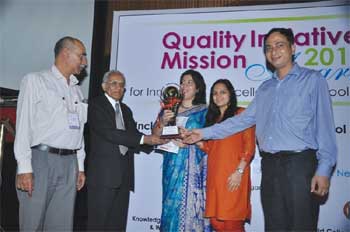
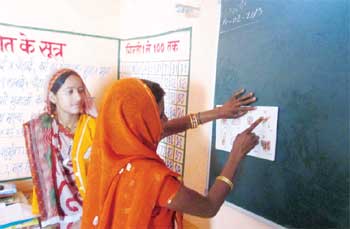
Education centre for women
An adult education centre was set up in February at Chainpura village in Vijaipur, Madhya Pradesh, to cater to women of the village, majority of who are illiterate. The demand for the centre was raised during a routine parent-teacher meeting at the village, where currently a bridge course is being conducted for the children, in partnership with GAIL (India) Ltd. Several women who attended the meeting keenly expressed a desire to study and become literate. Most of these women come from families that are into daily wage work.
Currently, the centre caters to about 25 women. There are no fixed timings as these women try to juggle farm work and household responsibilities. A teacher has been appointed to teach them basic language skills in Hindi and English and simple maths through a specially formulated weekly lesson plan.
The centre has brought about an improvement in the functional literacy level among the women as they can now read and write Hindi and English alphabets and do counting of numbers. Some women can even read books with little assistance from the teacher.
Vijaipur issues in MP Jan Abhiyan Parishad
S mile Foundation was invited in January to take part in discussions with the Guna block level officers of Madhya Pradesh Jan Abhiyan Parishad (MPJAP), a nodal body of the state government working on issues like education, environment, malnutrition, healthcare, etc. at the village level.
The meeting was chaired by District Coordinator, MPJAP, Mrs. Manjusha Soloman and discussed issues related to Right to Education (RTE), malnutrition, environment conservation, energy, total sanitation campaign, etc at the village level. The programme team also got an opportunity to further linkages with the government officials and apprised them about the Integrated Education and Health Programme being carried out by Smile Foundation in the five villages of Vijaipur.
Also discussed was the setting up of an Integrated Child Development Services (ICDS) centre in Chainpura village to improve the nutritional and health status of children in these villages.
